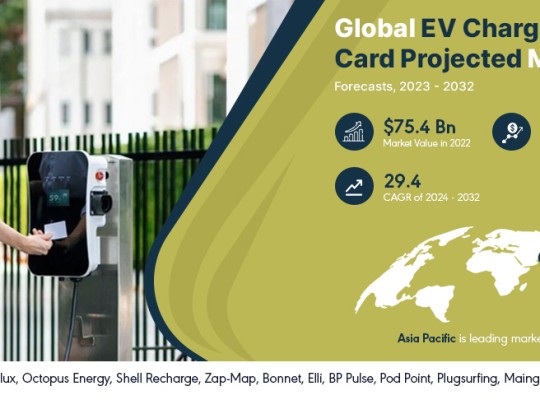According to the new report titled ” EV Charging Card Market by By Type (Physical Card and Application), By Application (Household and Commercial) Global Analysis to 2023″, the valuation of the EV Charging Card Market was $75.4 Billion in 2022 and is projected to reach $306.6 Billion by 2032, at a CAGR of 29.4% from 2024 to 2032.
There is a significant demand for a cleaner environment that has boosted the development for the cost-effective green vehicle technologies, like the EVs”. With the skyrocketing numbers of the EV adoption, the significance of the charging structure has increased significantly. Also, the RFID (Radio Frequency Identification) tech plays a crucial role in the EV charging and the mobility services by enabling the automatic user identification through the transmission and reception of data using electromagnetic waves between devices in close proximity. RFID cards enhance user experience and operational efficiency by providing secure access to vehicles and charging stations, simplifying processes like vehicle identification, payment, and tracking. This technology fosters seamless interactions between devices, supporting multiple functionalities like toll collection systems, warehouse goods tracking, and contactless payments via mobile applications.
In the realm of EV charging networks, RFID cards are instrumental in facilitating efficient energy management and peer-to-peer energy trading. Platforms like Share & Charge leverage RFID technology to establish private EV charging networks, promoting energy sharing and enhancing the overall sustainability of electric mobility solutions. Moreover, integrating RFID technology in smart microgrids enhances interoperability and efficient communication within energy systems, facilitating the seamless exchange of information and services among interconnected devices.
Physical Card to holds the largest share in the EV Charging Card Market. By Type, the EV Charging Card Market is segmented into Physical and Application. One of the major reasons the physical card segment is dominating is due to the high preference for the physical cards among the segmented users because of the ease of use, their familiarity with the physical cards and its reliability. The cards offer a very tactile and suitable way for users to use the charging station without any need for the complex digital interfaces or on smartphone apps. Also due to the widespread availability and approval of the cards across various charging networks and location. The physical card user finds it very useful to carry the card, which can be used at several charging stations, reducing the need of carrying multiple digital accounts or apps. Also, the physical card segment dominance is bolstered by the current infrastructure and the compatibility of the physical card readers at charging stations. Several charging stations are decked with physical card readers, making it convenient for the users to initiate charging session using their EV charging cards without relying on internet connectivity and mobile apps.
Asia Pacific headed the EV Charging Card Market in 2023. Asia Pacific is emerged as leading market for EV Charging Card Market in 2023. As China being the most dominative and emerging global leader in the adoption of the EVs, pushed by strong government support, initiatives and aiming to reduce the overall emissions. Not only China but various countries have made considerable investments in developing and enhancing charging infrastructure to help grow the EV vehicle market. Even the Chinese government has stared offering tax breaks for the EV buyers, which has also increased the sales at a higher rate. The increased surge in the EV adoption has created a significant demand for the EV charging infrastructure positioning China as a prominent player in the EV charging market.
Key market players operating in the market that are profiled in the report are E-Flux, Octopus Energy, Shell Recharge, Zap-Map, Bonnet, Elli, BP Pulse, Pod Point, Plugsurfing, Maingau etc.













